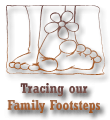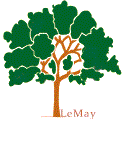| My Ingrisch Family I Came to Know
by Jody McKim
|
The earliest memories I have of my
Grandmother
Katharina Marie Ingrisch known as "Katie"
was at the age of 5, when we moved from New Jersey to
Atlanta, Georgia in 1959. By then, all who
remained of the
Martin
Ingrisch &
Elisabeth
Ingrisch geb Marmon family were their children
Katie age 66 and her younger siblings John, Martin,
Tony, George, Lizzie, Margaret and Charlie.
And in all the years they lived I never learned any
information about the old country. I always knew my ancestors were German-Catholic
and were from Austria-Hungary, but never questioned our
ancestry.
This
story is mainly about my Grandmother Katharina Marie Ingrisch known as "Katie." From
1959 to 1992, when Grandmother died, I only recall a few
conversations about the old country and never knew of other relatives in America
outside Georgia.
In
1906-1907 Grandmother's family journeyed from
Austria-Hungary to America and in 1999, it was with
great interest that I journeyed back in time to discover
my roots and indeed to the homeland. Since then I
have discovered new cousins and expanded my family. |
|
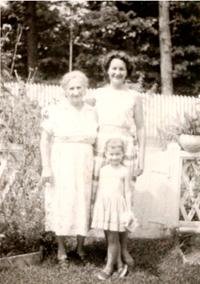
My Grandmother Katie, my Mother Laura and me, Jody - in the garden
at
Brookhaven, Georgia - 1960. |
With great
joy I share the story with you, about the Ingrisch family I came
to know . . .
The memories I have of my family is at Brookhaven, an area
of Atlanta where my Grandmother Katie lived. The house in
Brookhaven was built by my Great Uncle John Engrisch built while
he was married to his 2nd wife Ruby Reynolds who had died on her
front porch 19 May 1953 after returning from the garden.
Soon after Rudy died Grandmother who had been living in her own
house on Lookout Ave, in NE Atlanta, moved in with Uncle John.
Grandmother's oldest daughter (my Aunt) Frances and her daughter
Anne
Little Allen lived with them and Grandmothers youngest
brother Great Uncle Charley lived there too.
In 1998, I retired from Skip Tracing, I decided to go to Europe. My Grandmother's
family history had always intrigued me, because I knew NOTHING
about them except they were from Hungary. I thought this
may be a great opportunity to visit the archives in Hungary
and locate our ancestors, and Budapest the capital sounded like a
great place to visit. So in January of 1999 I booked
our flights, it was set I was going in March 1999.
About this time my Great Aunt Margaret (Engrisch) Stephens
passed away, she was such a sweet lady who always had a smile on
her face. At the funeral I mentioned to some cousins I was
going to Hungary in search of information and to see the old
country and if anyone had information, please inform me.
No one had any additional information, just they were German-Catholics from
Austria-Hungary.
With not much time left to prepare before the trip, I began to
ask my Mother questions and she recalled Grandmother talking about
where they last lived, a place pronounced Tem-e-shaw. I couldn't find it on a
current map, so I visited the library and on an old gazetteer located a city that
was close in spelling "Temeswar."
Further research I discovered the name had changed to Timisoara and was no longer in the country of
Hungary, but now in Romania! With one week before
departure there was no way to change my destination.
Just days before the trip I bought my first computer but lacked
internet skills which would have enabled me to prepare for a genealogical adventure
properly.
March of
1999, I left for Europe. It was a very long flight, a day stop over in Zurich (a very liberal place) and then went on to Budapest,
a beautiful and wonderful place to see! I inquired about traveling into Romania
and everyone
advised not to go, especially without a guide who could translate. Even so, I had to go -into the
unknown. My Grandmother's homeland was a four hour train ride away and
I had my sights on Temeswar/Timisoara.
On our
5th day, we left Budapest by train to Romania, it was a clear
day & extremely cold.
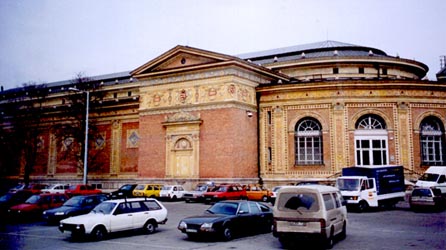
Budapest Train Station
- a marvelous old building.
The first hour seemed to go by fast, then time began to drag.
I
didn’t know where I was going or what to expect when I arrived.
The countryside of the southeastern Hungary is absolutely beautiful.
Neither words nor pictures can truly describe it. I ran my video cam
almost the entire time.
As the
train hurried down the track my eyes stared out the window, as the empty
fields, horse-drawn wagons, ducks and small villages whizzed by. As we
approached the border, the sound of the train seem to get louder,
ca-chug-a-chug... ca-chug-a-chug, and then the brakes went on and the
whistle blew. I could see the border patrol with rifles strapped
to their sides.
Several Romanian police rushed into
the train cars. They searched everywhere, asked us how much money I
had, checked my bags and looked under the seats. For cast-a-ways? For
drugs? I could not understand a word they said. They
finally left and returned to their post.
After the border fright....we moved on into Romania. All of a sudden
the scenery changed. Do you recall the photos of Kosovo? Romania
is similar in many areas. Unlike the charming villages we passed in
Hungary, the villages I was now seeing were old and run down. It was
absolutely sad and I cried as I saw this. Wondering what my mother
would think if she was there to see this, better yet Grandmother.
We
arrived at the train station in Arad, Romania.
|
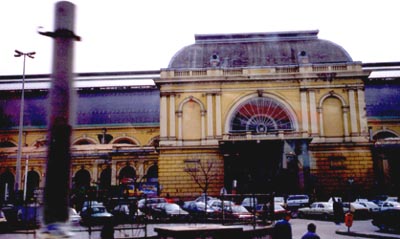
Arad Train Station (front) 1999 |
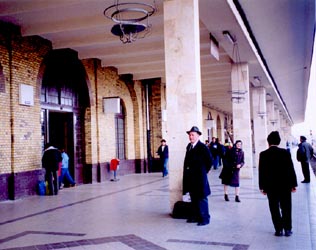
Arad Train Station (back) 1999 |
To us, it
seemed to be a chaotic place. There I was on foot, crossing a
four-lane streets with no traffic lights, dodging cars and racing across the
street with luggage. It was cold as ____. I could find no one
who spoke English, and began to feel scared. I have been a lot of places
& seen a lot of things but this place had me worried.
I approached by a ruthless looking man who spoke gibberish
English...he was a taxi driver. I managed to understand Temeswar
(Timisoara) was about an hour away and he could drive me there. Great,
now I'm getting somewhere. This turned out to be a ride from
____! This man did not know the words "SLOW DOWN" and there were no speed
limit signs. He was all over the road. I got a lot closer to the Lord
during that ordeal...
As a child, we didn't
have much and we knew hard times, but this would have been a very hard
existence to bare. I thought of my Great Grandparents who once
lived in Banat and how we here in the US we take so much for
granite. Believe me, we do have so much to be grateful for.
As we
approached a city, I looked up into the sky and there was an iron sign
scrolled "TIMISOARA” spanning across the four-lane highway. We
were almost there! To what, I would soon find out. The
streets we drove through were almost like ghettos. In a moments flash
the driver stopped and hollered, "get out!" – “Where are we?” I asked... and
no one spoke English. He pointed to another taxi driver. Oh
great here I go again, on another joy ride.
Everything that was going through my mind during these moments brought to
mind how the Ingrisch family came to the US to have a better way of
life for themselves and their children. Who crossed their homelands by
wagons, trains and then across the ocean by steamship - traveling with
hundreds of other people in steerage! So I guess our minor adventure
was nothing compared to what they endured.
Feeling abandoned in the middle of the ghettos, eventually I accepted a ride with another taxi driver, who didn't speak
English at all! By this time I began to feel a little
discouraged. As we rode down the streets I watched for anything
that looked official, like an American Embassy.
I
finally spied what looked to be a police department & told the driver to
stop. I got out with luggage in both hands and looked stranded, worn
out and hungry, as I was. There were people standing all
around staring at us. I attempted to communicate with them, someone
said "wait - just wait."
After standing
there lost for a while, along came two Latter Day Saints
Missionary boys. I was sure glad to see them. They were from the
US and said they were as glad to see me, an American also! As there were not that
many Americans there to chat with. They took me to their nearby
apartment for refreshments and to rest, then around the town to find a Hotel. These two young men who came to
my rescue,
were the first of many gene-angel blessings sent my way during
this trip.
After checking into
the Continental Hotel (don’t go there), I dropped my bags and freshened up and decided to find a place to eat. On my way out I stopped
at the concierge desk and asked for their local telephone book & looked
up the last name "Ingrisch" and there were 2 listings. The concierge
made the calls for me. The first # was disc. The second number a lady
answered and said to call back in the evening when 'the man of the house'
was home.
After dinner a
taxi to drive me around a while, -taxi fare was inexpensive. I was a little nervous about meeting possible distant relatives
but I couldn't stand the wait, so I had
the cabby drive me to one of the Ingrisch addresses. A very nice home and the property
gate was close to the street. Most of the homes had little
property but they had a very nice sized yard. Looking at the house was not enough for me, I had make contact
and see who answered; I had to look into the eyes of a an 'Ingrisch!'
While the taxi waited, I rang the
bell at the gate near the street. Momentarily a very handsome man
professionally dressed came out. After announcing who I was, etc, he immediately said "Oh yes, we heard about
your telephone call this
afternoon, come in" - With a big smile on my face I entered their home. The man paid
the taxi driver and sent him away.
I immediatedly was greeted by the lady of the house, Eugenia Ingrisch
who began hugging me. She was crying and
speaking Romanian, but I couldn't understand a word she said. Her
husband "Josef Ingrisch" spoke German and neither spoke
English. But again as before with the missionary boys, I were blessed
again with those who could speak English. The gentleman,
Alex Ingrisch who
had greeted me at the gate did speak English. He & his wife
Gutwein had just flown in that day from Germany where they live.
They invited me to sit at a “very” large table and the lady brought out
fresh made apple strudel and home made wine & Turkish coffee...it was very
strong. They seemed to be as glad to see me as we were to see
them. I was a stranger and they took me in, we all cried. I
only knew one grandparent, Grandmother Katie. When she
died in 1992, at age 98, I felt as though my roots were severed. But at
that moment for some strange reason, I felt at home, like I belonged.
Most of us in America are 1st or 2nd generation Americans. Like me,
some of you reading this may not know your family history, I was about to
learn about mine. For me, at that moment I couldn't have been at more
peace. I wished my mother could have been there to experience it with
me first hand.
This family said their Great
Grandfather had a brother who left for the US & never returned and never
heard from him again. Said he was a cabinetmaker, like my Great Grand
Father. They told me the history of the Banat Region and about it's
ethnic German
Donauschwabens. The Ingrisch family came to this region
called "Banat" in Austria-Hungary during the 1700's from Germany and other
areas traveling down the Danube River, thus getting their name "Danube
Swabian." The Ingrisch family had lived in the Village of
Mercydorf about 20 minutes away. We planned to go there the next day.
The Ingrisch family spoke of the hardships
they endured through the years of World War 2, as they ethnic Germans who
did not comply with Hitler, were shipped off to labor camps. They told
us how they lost everything to the State of Romania, even the homes that had
been in the families for years. That means the state of Romania owned
everything until 1989 when Nicolae Ceausescu, 1918-1989 Communist official
who was leader of Romania from 1965 was overthrown and
assassinated in the Romanian Revolution in December 1989. I won’t attempt to repeat everything he said because during those moments
"facts" were not on sticking in my mind. Unfortunately afterwards I
wished I had paid more attention to him and took notes.
They
were shocked I knew nothing about the history of Banat, saying to me “You
don’t know your history?” - I was embarrassed and ignorant, as I was.
But in my defense, my family were told to assimilate the American customs
and not speak of the old country and we certainly were not taught about this
forgotten people, the Donauschwabens of Banat in Austria-Hungary.
At
the end of the nineteenth century, there were more than two million Germans
living in Hungary. During the eighteenth century, the Habsburg monarchy of
Austria, which ruled Hungary at that time, had enticed Germans to emigrate
to the unsettled lands of Southern Hungary, which had been devastated by
over 150 years of Turkish occupation. From 1711 to 1750, approximately
800 villages were founded in Hungary by German settlers. The Banat Province
was one of the primary areas of settlement. See
Map
of the Origin areas of the Banater Swabian to Temeschburg, Banat.
That
night they drove me around town and took me to a better Hotel, close to
their home, the Perla Hotel. Thank God, another blessing.
Oh by the way 'this particular night' was the same night the air strikes
started in Belgrade, about 50 miles just south from Timisoara. I was
so excited that night, the events in Belgrade was the farthest thing on my
mind. Yeah I was scared, but if I died that night I would have died happy.
I was about to embark on a dream, to see
the village of my Great Grandfather's birth. I realized that night how
small the world really is. And sometimes we can't see the forest for
the trees. We get so caught up in the details of the every day that we
never think about what it was like for our families who came to America to
leave the ones “they left behind.” Parents, children and friends
who they would never see again. I know that had to be heart wrenching.
Imagine now, leaving your parents, children and friends to go to a foreign
country, knowing you will NEVER see those people again. I am not sure
I could do it. Maybe that is why Martin Ingrisch forbid his children
to talk about the old country, could be to make it easier to move forward
with their new lives.
My visit to
Mercydorf was a memorable one. My discoveries were enlightening not
only for ancestral facts but also for self-discovery.
We traveled to the "Village of Mercydorf" leaving the main highway to a less
traveled road. We had to drive through another village called
Sankt Andreas. The anticipation grew and I pondered thoughts of my
Grandmother passing on this same road when she was a child. I tried to
imagine how it was through her eyes of a young girl.
It was very cold that day just as it may have been on any day in
Grandmothers life. I wondered if they rode a train into town, as we
passed over a train track. Or maybe she rode in a
horse drawn wagon like the one
we had passed or did she have to walk.
As
we entered Mercydorf the first thing I spotted saw was a Stork perched in her nest atop a
chimney. Storks do exist after all! Something I've never seen before.
The village was quaint & very well maintained. I was told, Mercydorf was
once a thriving German village but was now occupied mostly by Romanians who
lives hand to mouth.
Most of the
houses still had the German family names etched atop the house. I
could not believe how these engravings still exist after all these years.
They took us to a house where once stood an "Ingrisch"
house" where they Grandfather had lived. The last Ingrisch family
who lived there returned to Germany in the late 1980's after the revolution.
The new home owner allowed us to look around and take pictures. The
original water
well still stood. The grape
vineyard,
the courtyard and gardens reminded me of Grandmothers I played in as a child
in Brookhaven.
Before leaving on my trip, I had asked my
Mother what she'd like me to bring her back, she replied
"dirt" from the land of her Mother. What better place to get it from
than an Ingrisch yard. The current owner overheard my speaking of my Mom's request and he
scooped up a bag full of dirt. Mom was shocked!
We visited the
Mercydorf Cemetery and located 2 Ingrisch graves. I know there
were many overlooked because the cemetery was rather large. There were graves
dating back to the 1700's.
The grounds
keeper (a kind
man and his wife, Mr. Minich) opened up the
Mercydorf
Catholic Church. It was built in 1737 and still looked great.
Hand painted ceilings and murals crowned the church. They lit the candles
and allowed me to take pictures. In one of the conversations I had
with Grandmother, I asked what special thing she recalled about the old
country, she said the Church, it was the most important part if their lives.
As I have learned "Kirchweih"
the largest holiday is on the last Sunday in October: the Kirchweih
(consecration of the church). Already the drive of the whole "Kerweih
Week," left the presentiment of things to come. In the shops
there is a lot of activity, in the homes everything is turned upside down to
clean them thoroughly, there is cooking, baking, roasting. Then
everything must be finished to a "t" by Saturday. The skirts were
starched, ironed, and soon they had to run to a tailor to try on a "Kerweikleed"
(Kerweih clothing). I am sure this is part of what Grandmother
was talking about. This being such a major event to "never
participate in again" must have been very hard for Grandmother not to
miss. But she moved forward with her American way of live
and never complained.
There was a store directly across from
the Ingrisch house I visited. The school is very small and the
toilets were outback. The one room schoolhouse is heated
by one stove in the room. The people there are very poor there and
many orphaned children. Mostly you see horse & wagons, few cars,
at least during the day. I were told there are only 3 phones in the
village at that time. Each family there has a small plot of land, some
very small. But the utilize every bit for vegetables, grapes and
flowers.
Everyone I met was gracious and
happy to see visitors to their village. The older
women wore long black skirts, black sweaters, black stockings and
boots. I saw no children, but since it was a week day, I assumed they were in school.
I took many pictures and ran the video recorder for the most part, until our
battery ran out. Guess I should not have kept it on during the train
ride. The voltage is different from the US; and I couldn't recharge
my video camera! I couldn't even use my blow dryer, which was
devastating! But I was able to capture on video Alex & Gertwin
and Josef Ingrisch Jr., during our visit to the Mercydorf Cemetery.
There Alex gave a short history of the German’s in the Banat, ending well it
looks like you found your roots, here in Mercydorf. I love their
accent!
Finally we left the
village and parted ways with the Ingrisch family that I had met. I spent
the rest of that day in the town of Timisoara doing research and
wound up in the Mayor's office. His assistant spoke English and again
I was blessed. I toured the city known for it's wonderful
architectural buildings which have been standing for centuries.
That night on TV I heard the Air Strike in Belgrade news. It was
horrible to see what was going on. And to think how close I was
.....50 miles away. It is a fact that invading hordes, ambitious
empires and the cultural divide between east and west have left the Balkan
Peninsula with a legacy of continual conflict. Back at home our TV
footage of current day wars, it cannot depict the true impact, which takes
place in these countries.
The next day...I was due to return to
Budapest via the same route I rode in on. I'd have to pass the
Mercydorf on turn off on our way towards Arad, where I'd catch the
train. At the hotel I interviewed several taxi drivers and chose one
that spoke some English and had a decent auto and who was willing to go to
Mercydorf and drive me around. I had to go back to Mercydorf, this may
be the only chance I have to see it again. I wanted to see it again,
feel it again, smell it again and try to capture the memory in my mind.
Today I was more acquainted with the
surroundings in Mercydorf than the day before. The Stork still was nestled in her
nest and the streets were still quiet. Quite different I'm sure from a
hundred years ago when the town was active and thriving.
The Donauschwaben Colonization came to be known as "der Grosse Schwabenzuge"
or "the Great Swabian Trek." The region became known as "the
Bread Basket of Europe." The hardships endured by the groups
of colonists is summarized in this known verse by their descendants:
"The first encounters death, the second need, only the third had bread."
During this last tour through the village,
I were blessed yet again with a woman who spoke English. She was so kind,
as everyone was. She rode around with me and stopped to talk with anyone we saw. The lady said she knew of
the
oldest lady in the village and took us to her house. The young
woman translated to the older woman who we were and if she had known the
Ingrisch family. The girl said the woman told her she was born an Ingrisch.
But the woman seemed confused about who I was and was already on her way
for a walk about town. Quickly I took her photo and as she stopped to visit lady neighbor.
I concluded, Ingrisch was her maiden
name.
NOTE: (Long after returning home I received an email from a fellow
Banater – Oct 21, 2000: In the usual list of birth / anniversaries which
comes with each issue of the Banater Post is in the 5 Oct 2000 issue under
the Village of Mercydorf (1) Maria Fedrich geb Ingrisch on 14 Oct in
Mercydorf, She is 81. This was a birthday announcement.
This was the the lady we spoke with. Thank goodness I took
photos of her.
NOTE: Just days before I
received the above notice I received information regarding the Mercydorf
Heimatbuch listing the Ingrisch families of Mercydorf 1940-45. There
were many. One family being reported: Jakob Ingrisch, wife
Susanna Mehrfeld at house # 327 – also at 327 was Peter Fedrich, wife Maria
Ingrisch, child Maria. (Sounds like this was the lady we met)
Walking in the footsteps of my ancestors to
see where they lived and experience how their daily lives may have been was
very touching to me. As I spent my last hours in Mercydorf, I walked
about and cried. I thought I probably would never return. I
looked out at the roads that branched off around the village and the
winding lanes
and scoured the houses that lined the streets. I smelled the cold
fresh air that brushed across my face. And as I rode out of the
village, I looked back through the taxi window at the Ingrisch house one last
time . . . saying goodbye.
Reflecting on the
trip and what I had learned, despite the hardships German Banaters had to
endure, they never abandoned their hopes and dreams. From where they
began in Western Germany to the Austro-Hungarian Empire (now lands in
Romania) to the ports of America and scattered around the world, they have
been a definite impact on society, as we know it today due to the cultures
and educational values brought forth by the Donauschwaben people.
Their rich heritages and traditions have flavored the American & Canadian
Soup.
In this age we hear a lot about
diversity. In most respects we tend to relate this issue to the
African-American. But diversity stretches over all races. Let us
not forget what is inscribed on the Statue of Liberty...
Give me your tired, your poor, your huddled masses yearning
to breathe free, the wretched refuse of your teeming shore.
Send these, the homeless, tempest-tost
to me. I lift my lamp
beside the golden door!"
As am American...I inherited my passage rights, by those that came before
me, those that struggled so I could have this life, as I know it. The
only true-blooded American's are the American Indian's. The rest of us
are here because someone else came before us. I breathe free today and
live in a land where I can worship as I choose. We mustn't take
that for granted. History repeats it self, because man refuses to
learn from the past. We are history in the making; let's make
the best of this life for our children and theirs.
Jody McKim © 2000
******
My
Grandmother Katharina "Katie" Ingrisch, was an amazing woman. At age
14 she journeyed to the US with her mother Elisabeth and her siblings to
join their father Martin Ingrisch, in Atlanta, Georgia. They
traveled in steerage of a steamship. These steamships could
accommodate as many as two thousand passengers in steerage. It was
called steerage because it was located on the bowels of the ship where the
steering mechanism of the sailing ships had once been located. From
what I have read these long narrow compartments were divided into separate
dormitories for single men, single women, and families. Jammed with
metal-framed berths three bunks high, the air in steerage became rank with
the heavy odor of spoiled food, sea-sickness, and unwashed bodies. There was
little privacy, and the lack of adequate toilet facilities made it difficult
to keep clean. Lice was very prevalent and it is said "the atmosphere
was so thick and dense with smoke and body odors that if your head itched
and you scratched your head, you got lice in your hands."
By 1910 many ships had replaced steerage with four and six-berth Third Class
cabins. But not soon enough for Elisabeth and the children.
******
Most
of our ancestral lines came directly from Germany,
but
I learned via hiring a
professional Genealogist in Romania that our direct
line of INGRISCH, Joannes Raimundus was in
the military when he came to Banat region in Hungary, first
settling in
Neubeschenowa and then most likely after marrying, he
moved to
Mercydorf.
Recently I located a new cousin,
Jeanne Honich of St. Louis. She provided a
Genealogical Chart which had been in her Ingrisch-Honich family for over a
hundred years. The chart introduces the parents
of Joannes Raimundus, Anton INGRISCH and Anna
Marie Wollrab, their other children remained where
they were born, in Rajau, Bohemia, Marienbad County,
today it is Czech Republic. Yvonne Juhl, a dear friend
translated the
Genealogical Chart into English for me.
After receiving Jeanne's chart, I began searching for
Ingrisch in Rajau,
Bohemia and Marienbad County. I located a man with the
"church records from Marienbad County" known as
Kirchenbuches (Familienbuch), vom Ort Rojau (Rajov) bei
Marienbad, and I
wrote to him requesting assistance. Was I surprised when he replied, sending
me the actual
Church Record Entries for our INGRISCH. This
was further confirmation about our Ingrisch family. He
also stated his wife was also from the Ingrisch
family.
As you can see on both of the above documents, Joannes'
siblings remained in the Marienbad area. The only one
mentioned in regards to the Banat was Joannes Raimund INGRISCH, which this further confirms
the findings of the Genealogist I hired 3 years ago, view
his finding on the Ingrisch Genealogical Chart.
There are suppositional Engrish's
introduced to consider (in the far right column) but the
last
verified
ancestor is our
very own
Joannes Raimundus
INGRISCH, who
reported a last place of residence (on his marriage
certificate) as Tepl.
I asked the Genealogist "how could it say he was from Tepl,
if he was born in Rojau,
(according to the church registry in Marienbad County).
He explained Tepl is a
military location and apparently, Joannes was in
the service and transferred to Banat, Hungary.
To
understand further, please read the article about the
Donauschwaben People and you will learn what brought
the Germans down the Danube River into the Banat Region of
Hungary during the 1700's.
After emigrating to Banat, Hungary I presume Joannes
Raimund INGRISCH caught the eye of an older
woman Barbara Bauer who he married on 19
Dec 1793 in Neubeschenowa, a
village in the region of Banat, Hungary; a village close to
Mercydorf. They lived in house # H 129. You can
see a
picture of the old homeplace I took May 2004.
Barbara Bauer's
birth is not confirmed but could be abt 1750. She was
already a widower. Her father was Jacob Kifer.
Barbara died 27 Dec 1794 in Mercydorf, soon after their
first wedding anniversary.
Joannes Raimundus
INGRISCH then
married a second wife Catharina Malz
about 1799 in Mercydorf. (variant spellings
Malcz/Matlz/Malg). At least he waited a while before
remarrying but what was he doing for 5 years? The
genealogist did not find a marriage record for Joannes and
Catharina. Catharine Malz was born 2 May 1779 in
Mercydorf and
died there on 10
Feb 1834 at house # 58 (today Carani, Romania).
Joannes Raimundus and Catharina Malz had several
children. The first born was our GGG-Grandfather
Joannes INGRISCH B. ~1795 / 9 Aug 1800 in Mercydorf, house # 4.
The other children were Otilia, B 14. Dec 1802, Agnes, B 17
Mar 06, Joannes Petrus, B 9.11.1804, Franciscus
Xavier, B 2 Dec 1808, Catharina, B 12 Mar 1811, Franciscus,
B 5 Sep 1813, Jacob, B 30 Sep 1815, all in house # 97 in
Mercydorf.
Joannes INGRISCH
married 21 Nov 1815 to Christina WÜRZ
in Mercydorf. They lived in house #97. Joannes
died 13 Aug 1828, in the village he was born, lived and died
in Mercydorf. He and Christina had several children, one being
Jakab
INGRISCH who is the father of our
Great Grand Martin INGRISCH (PAPA).
Papa married Elizabeth MARMON (their marriage was
arranged) I had heard Papa was a shy man. Now, I heard
Papa had a cabinet shop in Temeswar and business was
not good. He sold it and since he was not the first
born son he would not inherit the farm in Mercydorf. Along
about that time a
Michael Schick (a brother in law - I have
not located him or his family - yet) immigrated to the US.
And
Papa and Uncle Anton Marmon joined him here in
Atlanta in 1906.
Elisabeth
and the children followed the next year. He
came for opportunity and for a better way of life for his
family. The only thing mystical about it is, why
Georgia, when there was soooo much going on in the northern
states - and he could have worked and lived amongst fellow
Donauschwabens from his homeland.
To be continued . . . one day
Last updated:
19 Jul 2012 |
|
